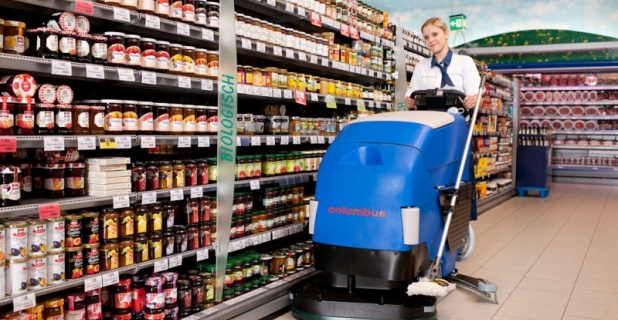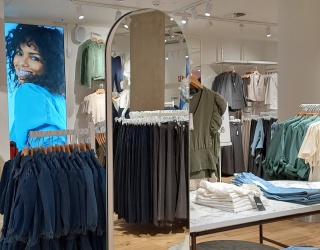Early in the mornings or after hours, cleaning machines are kicking into action in supermarkets and specialty stores. Some retailers are not waiting until all customers have left the store. The work needs to be done by staff during working hours and quite possibly customers are meant to see how seriously the store takes the issue of cleanliness. Cleanliness in the store is very important to customers, but they expect more than just polished floors.
Retailers know from experience that first impressions matter. Customers get their first impression by looking at the shop window and when they enter the store. That’s why cleaning windows and floors is part of the regular tasks. Dusting is a pesky chore in domestic households, on a large sales floor it is almost impossible to do. Articles that are sold quickly don’t present a problem. But if dust collects on cardboard boxes, they are quickly considered shelf warmers. Some shelves look nice, but their fancy moldings or surfaces magically attract dust.
Test reports on the Internet show how important consumers deem the issue of cleanliness. Well-rated supermarkets appear ”clearly designed and clean“ or ”clean, tidy, always stocked and fresh“ as was reported in a Customer review for Rewe City Grünwald The term “clean” is mentioned a lot when customers give high marks. ”Clean“ however apparently means more than just “immaculate” to many customers. They take it for granted that a store is cleaned properly. This doesn’t just apply to the sales floor, but also to customer restrooms or changing rooms.
”Clean“ is often equated with “neat”. Customers demand that there are no empty cardboard boxes in the aisles, merchandise on the shelves is not hanging or lying in every which way, that there are no withered lettuce leaves in the shopping carts and that staff is not filthy. Cleanliness is also subconsciously conveyed through fresh air. Bad odors and stains share one thing in common: if they stand out, somebody did some sloppy work. Oftentimes a subconscious factor is being registered – with negative impacts for image and sales.
Floor cleaning is essential
Just like in every domestic dwelling, every store also has certain corners where dirt gathers. Some critical consumers look very specifically for these spots and talk about it to their circle of friends or also on the Internet. It is not easy to clean behind doors, under shelves or store fixtures.
During the winter and when it’s raining outside, the entry way becomes a critical area since visitors have a lot of dirt on their shoes and carry it into the store. Door mats help a lot, but they also have to be looked after and cared for. Tiled floors in many supermarkets can be easily cleaned with cleaning machines. Natural stone flooring that is meant to provide a more sophisticated ambiance in some fine supermarkets or specialty stores in their non-food areas is more difficult to take care of. Those who choose plastic flooring covers, wood or carpet should also take into account maintenance costs right from the start.
Vacuuming, mopping, drying – these have been the basic principles for cleaning machines for quite a while. At the EuroShop, exhibitors showed improvements in the details, for instance in cleaning performance or simplified emptying of the water tanks. Equipment without its own motor is more maneuverable, but it is supposed to become ever easier to move. The product range includes special machines for different types of flooring, but also all-round cleaning machines.
Herbert Dautel is Sales Manager for the South Region at cleaning machine manufacturer Staehle from Stuttgart, Germany, and in the business for over 30 years. He notices that the very big markets slowly start to clean all day long. In doing so, high suction output of the moist cleansing film is ”the decisive factor“ and quiet operation ”an advantage“. Except for in the U.S., Staehle sells its blue machines worldwide under the brand name Columbus. While Americans love high gloss flooring, in Europe people prefer a “matte finish“ says Dautel. Ride-on machines, a standard in the U.S., are especially sought after in home improvement stores in Europe.
How clean does a supermarket have to be?
In food retailing, the subject of cleanliness is a particularly sensitive one. On the one hand, the product should be presented as appetizingly as possible, but on the other hand you have to keep customers at a distance, for instance in the case of fresh fish. There are clear hygiene regulations for handling fresh, unpackaged food. They range from cooling all the way to hand hygiene for staff. The U.S.A. with its high damage claims show where this could lead. Signs warn about all kinds of theoretically possible risks and employees look more like they work in a hospital.
Retailers want to create a market atmosphere with their produce; everything needs to look fresh. Artificially polished apples don’t seem fresh, but neither does squishy fruit. Swarms of fruit flies deter from shopping. Leaking cups in the dairy section don’t look attractive and quickly emit rather unpleasant odors. Dried up remains are quickly noticed by customers. At the fresh deli counters it’s not just about a caring presentation of goods, but also about clean machines and cutting boards. Parsley is great for decoration, but it wilts quickly and then needs to be removed.
Consumers also keep a close eye on frozen foods. They pay attention to ice and frost as signs of problems in the cold chain. For energy saving purposes, instead of top open chest freezers, more and more food display cabinets with covers or food cabinets are being used. Cleanliness however then also includes that the windows are not foggy.
The cash register is the last leg for cleanliness
The entrance gives you the first impression when you shop and the cash register gives you the last one. Here, cleanliness is also important. This pertains to the conveyor belt for instance where customers place their items. In some bakery shops, the sales assistants only reach into the bread shelves with a napkin in hand as a matter of course. But this is not the standard. Oftentimes employees act surprised if customers complain when change and bakery products are handled by the same hands.
But things can also be different: At Hofpfisterei, a large Bavarian whole food bakery chain with stores located from Nuremberg to Garmisch, large gloves that you can quickly slip on during the sales process, have proven successful. Larger butcher shops separate where product is handed out and where money is taken. Change machines can be one solution or also cashless payment with credit card or cell phone – all current topics at the EuroCIS.
René Schellbach, First Publication: EuroShop.de
01/07/2012





